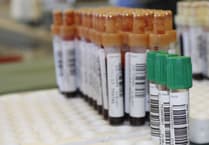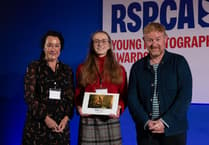FARMERS' panic has turned to resignation, said a leading member of Hatherleigh and Okehampton NFU this week who fears that the number of outbreaks in the Highampton area is reaching a 'critical mass.'
NFU group secretary Simon Wattler said with eight confirmed cases in Highampton and three in neighbouring Hatherleigh, he now had a 'very uncomfortable' feeling about the situation.
A farm at Broadwoodkelly and one at Northlew were also confirmed as having the disease this week, bringing the total of cases in the county to 15 — the highest in the country.
'We are looking at quite a few more cases now and it is starting to reach a critical mass,' he said. 'All we can pray for now is that the outbreak stops at the area around Highampton and Hatherleigh, where the original outbreak was.
'The sense of panic has gone and that has been replaced by a certain amount of resignation — farmers know there is nothing more they can do to protect themselves.'
Mr Wattler said the lack of information coming through from MAFF was a worrying factor and it was widely believed the situation was a lot worse than people were being told.
'MAFF simply do not let the information out — we hear it on the jungle telegraph quicker than we do from MAFF. If the disease has spread to the farm next door the least that should be done is to let people know about it.'
The outbreak is expected to peak this weekend, two weeks after the first infected animals in Devon were found on Willie Cleave's farm at Highampton.
Mr Wattler said everyone was just hoping it was not the beginning of a rush of cases.
'The incubation period for the disease is two weeks so we cannot know yet what is going to happen,' he said.
'One of the dangerous things is the psychological effect all this is having on farmers and that is why we are spending our time faxing, e-mailing and phoning them to keep them abreast of the situation as best we can. It is very important we keep them all talking.'
Firearms were confiscated from one desperate farm owner who threatened suicide after he was forced to calve Willie Cleave's disease-ridden animals.
George Thomas, who rents his farm at Highampton to Mr Cleave, was ordered by MAFF to take charge of the 130 pregnant cows until they could be slaughtered.
The farm owner began calving the affected herd after six days but eventually broke down under the strain caused by the delay in slaughtering arrangements.
Speaking to the Times this week Mr Thomas said he had received letters from John O' Groats to Land's End from sympathetic farmers.
'What I have seen in the last week is terrible and I never want to go through that again,' he said. 'I now have to put my life back together again and get on with it.
'I cannot thank enough the ministry vets, the police and my family and friends who have been wonderful.'
Jackie Ody, who runs Highampton Post Office said everybody in the village was keeping themselves to themselves to prevent possible spread of the disease.
Some farmers had not ventured from their property since the first outbreak in Highampton but food supplies were being delivered to their gate.
'Farmers are ringing us up with food orders,' she said. 'All we can do is just be there to help in any way that we can.
'It is still very hard to believe what is happening here and it is having such a knock-on effect — there is hardly any traffic on the road and everything is being cancelled.'
Fears increased with the news of the first case of foot and mouth being confirmed within Dartmoor National Park.
Hundreds of sheep and cattle were slaughtered at Dunnabridge Farm near Princetown.
The 600-acre Duchy of Cornwall farm is run by Roger and Marion Winsor, who first noticed signs of illness in their animals on Saturday.
Mrs Winsor told the Times this week of the experience that all farmers dread.
'You just can't describe the feeling, the desperation,' she said. 'We have been watching and keeping our fingers crossed and doing everything we could at ground level — what else can you do?'
'We have had absolutely no contact with Mr Cleave,' insisted Mrs Winsor, who said her husband was 'shattered' with the week's events.
'Last night they had to kill off the baby lambs — I don't know the number they killed yesterday, I don't ask,' said Mrs Winsor.
Mr and Mrs Winsor had 800 sheep and 170 beef cattle on their farm, including a herd of pedigree Welsh Blacks.
Mrs Winsor said Prince Charles had been in contact with her and her husband and was 'very concerned' at the situation.
Anthony Gibson, NFU regional director, said the outbreak, in the middle of one of Britain's largest livestock areas, was a 'nightmare'.
He said: 'Ministry of Agriculture vets are already at full stretch and beyond as it is, so there is no way they could cope with the operation that would be needed to deal with a full-scale outbreak amongst all Dartmoor's livestock. The Army would have to be called in.'
Dartmoor National Park Authority chairman Bill Cann said 'heartfelt sympathies' went out to everyone affected by the disease.
He said: 'It is clear the long-term implications for hill farming and its related industries, and for the tourism sector, are going to be severe.
'The authority will be looking to support and facilitate every possible means and aids to recovery as soon as the immediate crisis is controlled.'
l How the crisis has affected other activities — see stories on pages 2 and 3.



